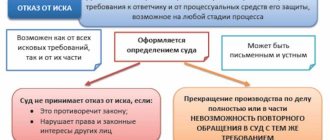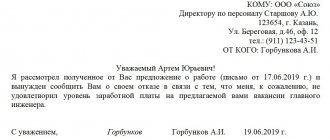The subject and basis of the claim in the arbitration process are considered to be those elements without which the document would be of a completely different type. The claim must include all parts specified in the current rules of the APC (Articles 49, 125, 148, 150, 151, 244).
The subject of the claim is necessary to determine the claim of the plaintiff against his opponent, the defendant. For example, debt collection, recognition of a contract as not concluded, and so on. The cause of action substantiates this claim by referring to certain factors that led to the violation of the plaintiff’s legal position and the emergence of a controversial situation.
Concept and features
The subject of the claim is a specific demand of the plaintiff against the defendant (subparagraph 4 of paragraph 2 of Article 125 of the Arbitration Procedure Code of the Russian Federation). In fact, the subject substantiates the controversial situation itself, the essence of the claim from one person to another.
There are various variations of the subject matter of the claim, among the most common:
- changing the terms of a previously concluded agreement;
- requirement to fulfill the terms of the transaction, for example, collection of debt under a loan agreement;
- compensation for damage caused outside of contractual relations, and so on;
- requirement for recognition of the plaintiff's legal right.
In this case, the subject should not be confused with the object of the dispute, which is also called a material subject. So, if we are talking about the collection of funds, the subject is the demand for collection itself, and the object is specific financial resources of a certain amount.
The basis of the claim is the circumstances that the plaintiff uses to substantiate his claims (subparagraph 5, paragraph 2 of Article 125 of the Arbitration Procedure Code of the Russian Federation). In essence, these are factors that justify the existence of certain conflicting legal relations between persons.
The legal basis of the claim is the legal norms that determine the claim. In the claim, the applicant must indicate which norms he refers to and why he believes that his demand is legal and fair. If there is no legal basis, consideration of the claim makes no sense.
The basis as a whole is not only the inconsistency of the situation with some legislative norms. It must also be justified by other factors that violate the rights of the plaintiff.
Only if there is a basis can we talk about the subject. Conversely, in the absence of an object there can be no basis. These concepts are interconnected; one cannot exist without the other.
Subject of corporate dispute
The subject of a corporate dispute can be any conflict between participants (shareholders), affecting the interests of both the organization itself and its participants. The claims that form the basis of corporate disputes arise for a variety of reasons.
The subject of a corporate dispute may include:
- establishment of a legal entity;
- liquidation or reorganization of an enterprise;
- restoration of participant (shareholder) rights;
- appealing decisions of the organization's management bodies;
- issues of exercising the preferential rights of participants (shareholders) when selling shares (shares) of the organization;
- challenging transactions made by the company;
- recovery of losses caused to a legal entity or its participants;
- elimination of violations of legislation and local regulations;
- compulsion to perform certain legal actions, etc.
Legal regulation
The legislator establishes that a claim will be considered legal and justified only if all the necessary elements specified by the law are present:
- subject of the claim (subclause 4 of clause 2 of Article 125 of the Arbitration Procedure Code of the Russian Federation);
- basis for the claim (subparagraph 5 of paragraph 2 of Article 125 of the Arbitration Procedure Code of the Russian Federation);
- details of the court (subparagraph 1 of paragraph 2 of Article 125 of the Arbitration Procedure Code of the Russian Federation);
- details of other parties (subparagraphs 2.3 of paragraph 2 of Article 125 of the Arbitration Procedure Code of the Russian Federation);
- price of the claim, calculation, information about the pre-trial procedure, information about security measures and attachments (subparagraphs 6-10 of paragraph 2 of Article 125 of the Arbitration Procedure Code of the Russian Federation).
If at least one element is missing, the document cannot be considered a statement of claim. Accordingly, it will not be considered as a procedural document and as having a basis for starting proceedings in the case.
However, claim proceedings are based not only on these norms. The rules of the Arbitration Procedure Code generally determine the rules of the arbitration process, while the parties can refer to the rules of the Civil Code of the Russian Federation, which determines the foundations of civil relations, as well as other federal laws and regulations, depending on the subject of the claim.
How is arbitration settlement of disputes carried out?
The law establishes the procedure for settling arbitration disputes. According to Part 5 of Article 4 of the APC, it is necessary to send the claim to the defendant - this is an attempt at pre-trial settlement. If agreement is not reached, the initiator of the claim sends a statement of claim to the court. Arbitration proceedings in the court of first instance consist of the following stages:
- Acceptance of the claim for proceedings;
- Preliminary court hearing – the court checks the readiness of the case for the main trial, the parties to the dispute become familiar with each other’s legal positions;
- Consideration of the dispute on its merits;
- Making a decision.
The decision comes into force after 30 days from the date of production in full; if the losing party does not agree with it, it can appeal it on appeal no later than 30 days. After consideration of the appeal, the decision immediately comes into force. You can then appeal an act that has already entered into force through the cassation procedure.
Difference between subject and basis: claim for award and claim for recognition
A claim for award is a demand for the defendant to perform certain actions or to refrain from performing them. This type of requirement is called executive.
In such requirements, the subject is considered to be precisely the requirement to perform an action (or to refuse to perform it). The basis will be facts indicating the occurrence and violation of the plaintiff’s right.
A claim for recognition confirms a certain right of the plaintiff, violated by the action or inaction of the defendant. The subject is considered to be a demand for recognition of a certain right, which was violated, and the basis is the facts on which the plaintiff substantiates his demand.
Definition of the concept of corporate dispute
A corporate dispute is a dispute related to the creation of a legal entity, its management or participation in a legal entity, which is a commercial organization, as well as a non-profit organization uniting commercial organizations and (or) individual entrepreneurs. This is usually due to disagreements that arise between participants (shareholders) regarding issues related to the management and conduct of business activities of the organization, and entailing a violation of their rights.
How and when you can change the basis and subject of a claim
The rules of the APC, in Article 49, directly provide for the possibility of changing and clarifying the subject or basis of the claim. Paragraph 1 of this norm provides for the possibility of such a change until a judicial act (decision) is issued.
The important point is that only one part can be changed - either the object or the basis, since when replacing two components, a new requirement is actually created, which should be considered separately.
It is important to understand what does not constitute a change in the subject matter or basis of the claim. If the subject changes, then the requirement to the defendant itself is adjusted, for example, instead of terminating the contract, the applicant demands compensation, or instead of eviction, recognition as having lost the right to reside, and so on.
When changing the basis, the plaintiff changes the circumstances on which his claim is based. They can be supplemented or completely replaced. This is formalized by a petition to change the requirements, which can be filed before the court goes to the deliberation room.
Re-filing a claim on the same grounds
In a certain situation, a citizen may need to re-file a claim on the same grounds. As a rule, this happens when the judge has issued a negative ruling on a previously filed petition. Filing a claim on the same grounds can also be initiated by rejection of the statement of claim or partial satisfaction of the requirements set out in it, which does not suit the plaintiff.
The procedure for filing a new claim on the same grounds is regulated by Article 134 of the Civil Procedure Code of the Russian Federation, which provides for the possibility of re-considering a claim, some elements of which have been significantly changed, but the motive for filing is based on the same facts. Since a repeated application drawn up on the same grounds is legally new, it requires filing, consideration and acceptance for legal proceedings under a new procedure. It is worth considering that Article 134 of the Code of Civil Procedure also specifies the reasons why filing a claim is not allowed:
- the statement of claim is a document that has a different jurisdiction or which should be considered in a different court procedure;
- there is a court decision on a claim with the same basis, subject and content, in which the plaintiff and defendant were previously parties;
- there is an arbitration court decision in a case with the same elements of the claim and with the same participants in the process.
If the claim was left without consideration due to the presence of procedural errors in its text, when drawing up a repeated application, both in civil and in arbitration court, it is best to use a sample. Today, using a sample is the most reliable and fastest way to do without the help of a lawyer.
You can file a claim yourself - a free form is quite acceptable. The main thing is that the document complies with the standards set out in Article 131 of the Code of Civil Procedure of the Russian Federation, which details the conditions that any civil claim must meet.
Applicant's capabilities
Quite often in practice there are cases when the plaintiff changes his legal position during the dispute proceedings. In the event that his interest remains the same, and only the size of the claims or one of the elements of the application is adjusted, the authorized body is obliged to consider the claim in a new form. The above-mentioned resolution of the Plenum of the Supreme Arbitration Court explains that changing the basis of the claim, reducing or increasing the amount of claims and other adjustments are allowed before a decision is made in the first instance. This opportunity can be used by the applicant during a new trial of the case in the same body if the decision is canceled by the cassation or supervisory authority. A change in the subject of the claim is the replacement of the original element with another, provided that the basis (the factual composition of the case) is preserved.
The procedure for making a decision by the arbitration court?
The court makes a decision based on the evidence provided by the parties to the dispute. Therefore, it is important to support claims and demands with written evidence: contracts confirming the obligations of one of the parties, as well as documents confirming the violation of these obligations. In cases where the dispute concerns the quality of the work done, for example, construction, then it is impossible to do without the appropriate examination. The lack of evidence and errors in its preparation reduce the chances of satisfying the claims. Therefore, you need the support of an arbitration lawyer who, before going to court, will evaluate your evidence base to ensure it meets your objectives, and will also represent your interests in court. The decision-making is also influenced by the behavior of the plaintiff at court hearings. Negative consequences, including the loss of a case, may be associated with the plaintiff’s attempts to deliberately delay the trial, the inability to speak convincingly in court, incorrectly drawn up documents, the absence or incorrect execution of evidence. And, conversely, professional preparation of documents and support from an arbitration lawyer significantly influence the possibility of winning a dispute.
Lawyer, Courts
Save:
Award
The subject in these cases is the legal possibility of the plaintiff to demand from the defendant, in connection with the failure to fulfill the relevant obligations voluntarily, certain behavior. For example, the applicant asks to recover a sum of money. In this case, the subject is the plaintiff’s material right to receive funds. In this case, the corresponding obligation of the defendant will be to pay this amount. The subject of a claim for compensation for damage caused is the right to demand elimination of the consequences that caused the damage. Accordingly, the defendant is obliged to take certain actions to achieve this task.







